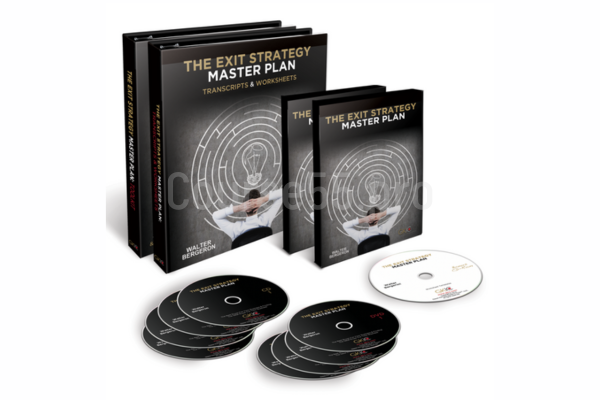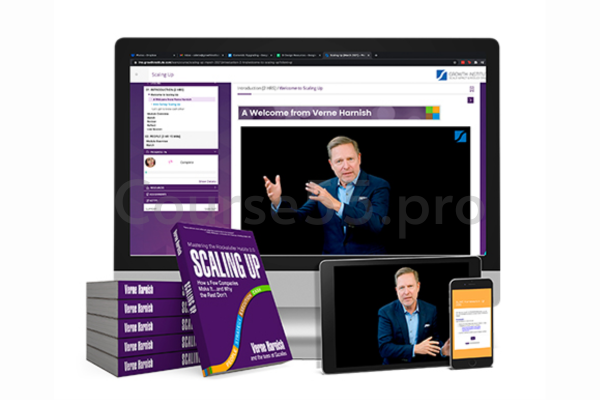The Exit Strategy Master Plan By Dave Dee
$6,991.00 Original price was: $6,991.00.$155.00Current price is: $155.00.
File Size: 1.99 GB
Delivery Time: 1–12 hours
Media Type: Online Course
The Exit Strategy Master Plan By Dave Dee – Digital Download!
Managing Successful Exits: An in-depth examination of master plans for business exit strategies
In the business world, being an owner can occasionally feel like navigating a huge forest. Every path eventually leads to a pivotal moment and an exit, but each bend offers different chances and difficulties. Having a well-thought-out exit strategy is crucial, whether you’re selling your business, transferring ownership, or taking a break from day-to-day operations. Not all business owners, though, are ready for this change. Here come the enlightening materials that offer a path through this complex procedure. Of these, Dave Dee‘s writings are particularly noteworthy as sources of wisdom, assisting owners in carefully and clearly developing their exit plans.
Recognizing the Value of an Exit Strategy
In the woods, having a compass is similar to having an exit strategy. It helps entrepreneurs navigate the frequently daunting process of leaving their businesses, making sure they get there effectively and successfully. An exit strategy is a methodical approach to selling or leaving a company that covers a range of topics, from financial planning to emotional preparedness.
Dave Dee explores the essential elements of creating a strong exit strategy in his well-known books. He stresses that company owners run the risk of leaving their future up to chance if they don’t have a clear plan. Similar to how a ship’s captain must choose a course to steer clear of hazardous waters, business owners must navigate potential pitfalls such as valuation discrepancies, buyer negotiations, and post-sale life adjustments.
Moreover, an exit strategy isn’t just about selling a business; it’s about securing the future of the owner and their legacy. The emotional weight of stepping away from a venture that has consumed significant time and energy cannot be understated. Therefore, integrating personal goals and values into the exit plan is essential for a fulfilling transition. By having a clear vision of what life after ownership looks like, business owners can make informed decisions that align with their aspirations.
Essential Elements of a Strong Exit Strategy
A thorough exit strategy takes into account both personal objectives and different aspects of business operations. The following components are necessary for efficient exit planning:
- Business Valuation: In order to negotiate a fair bargain, it is essential to know how much your company is worth. To stay up to date on their company’s standing in the market, business owners should conduct valuations on a regular basis.
- Planning for Succession: Finding people who can take over operations guarantees continuity. This could entail hiring outside talent or boosting current staff members.
- Financial Readiness: In order to show accurate and sound business performance, business owners must prepare their financial accounts.
Tax Planning: The ultimate sale price can be greatly impacted by knowing the tax ramifications. Liabilities can be reduced by using appropriate tax methods. - Advisory Group: Putting together a group of consultants that includes financial and legal professionals aids in handling complicated situations and improves the exit procedure.
- Planning for Life After Exit: Consideration of life after business is essential for emotional and financial well-being. Planning activities, hobbies, or roles in other ventures can ease the transition.
Insights from Mastering Exit Plans
The insights provided by Dave Dee resonate with the advice offered in related literature, such as “Master Your Exit Plan” by Chris Vanderzyden and “The Master Plan: Exit Strategy for Successful Business Owners” by Peter G. Christman. Both works underscore the importance of a strategic approach to exit planning.
Learning from Common Pitfalls: The “5 Ds”
Peter G. Christman introduces the concept of the “5 Ds” that frequently lead to the failure of exit strategies:
- Death: Without a definite successor, a sudden loss might leave a company vulnerable.
- Divorce: Financial and ownership concerns might be complicated by personal issues.
- Disability: Unexpected medical issues may cause business activities to be disrupted.
- Dissatisfaction: Making decisions can be impacted by strained relationships or disagreement.
- Disinterest: A hasty departure is frequently preceded by a loss of desire.
Understanding these potential hurdles is crucial for business owners. Christman advocates for proactive measures to mitigate risks, emphasizing the need for careful planning and consultation with experienced advisors.
A Comprehensive Strategy for Exit Planning
Christman and Vanderzyden both support an exit strategy that takes a comprehensive approach, making sure that all aspects of personal and professional lives are in harmony. This encompasses not just a financial viewpoint but also individual goals and emotional preparedness. Harmoniously blending these factors is the art of exit strategy creation.
Given this interdependence, it’s critical to recognize that exit options are more than just transactional. They require a broad perspective that takes into account personal goals, family dynamics, and the legacy a business owner wants to leave. For the owner and the community the business affects, this viewpoint turns the transition from a simple conclusion to a chance for development and rebirth.
The Way to a Successful Exit in Conclusion
Developing an exit strategy is an emotional process that combines personal and professional goals, in addition to being a business necessity. By using the knowledge of professionals like as Dave Dee, Chris Vanderzyden, and Peter G. Christman, entrepreneurs may create customized plans that are appropriate for their particular situation. Owners can successfully navigate the frequently turbulent waters of business transition and ensure a satisfying exit by adopting an organized, comprehensive approach that includes values, goals, and contingencies. In this sense, leaving becomes a fresh start rather than a conclusion, opening the door for further chances and pursuits.

Frequently Asked Questions:
Business Model Innovation:
Embrace the concept of a legitimate business! Our strategy revolves around organizing group buys where participants collectively share the costs. The pooled funds are used to purchase popular courses, which we then offer to individuals with limited financial resources. While the authors of these courses might have concerns, our clients appreciate the affordability and accessibility we provide.
The Legal Landscape:
The legality of our activities is a gray area. Although we don’t have explicit permission from the course authors to resell the material, there’s a technical nuance involved. The course authors did not outline specific restrictions on resale when the courses were purchased. This legal nuance presents both an opportunity for us and a benefit for those seeking affordable access.
Quality Assurance: Addressing the Core Issue
When it comes to quality, purchasing a course directly from the sale page ensures that all materials and resources are identical to those obtained through traditional channels.
However, we set ourselves apart by offering more than just personal research and resale. It’s important to understand that we are not the official providers of these courses, which means that certain premium services are not included in our offering:
- There are no scheduled coaching calls or sessions with the author.
- Access to the author’s private Facebook group or web portal is not available.
- Membership in the author’s private forum is not included.
- There is no direct email support from the author or their team.
We operate independently with the aim of making courses more affordable by excluding the additional services offered through official channels. We greatly appreciate your understanding of our unique approach.
Be the first to review “The Exit Strategy Master Plan By Dave Dee” Cancel reply
You must be logged in to post a review.

 DAY TRADE (LONG & SHORT) STRATEGIES PACKAGE - The Chartist
DAY TRADE (LONG & SHORT) STRATEGIES PACKAGE - The Chartist  The Residual Payments Blueprint By Mario Lallitto
The Residual Payments Blueprint By Mario Lallitto  Land Listings Unleashed By Cody Bjugan & David Hill - Vestright
Land Listings Unleashed By Cody Bjugan & David Hill - Vestright 













Reviews
There are no reviews yet.